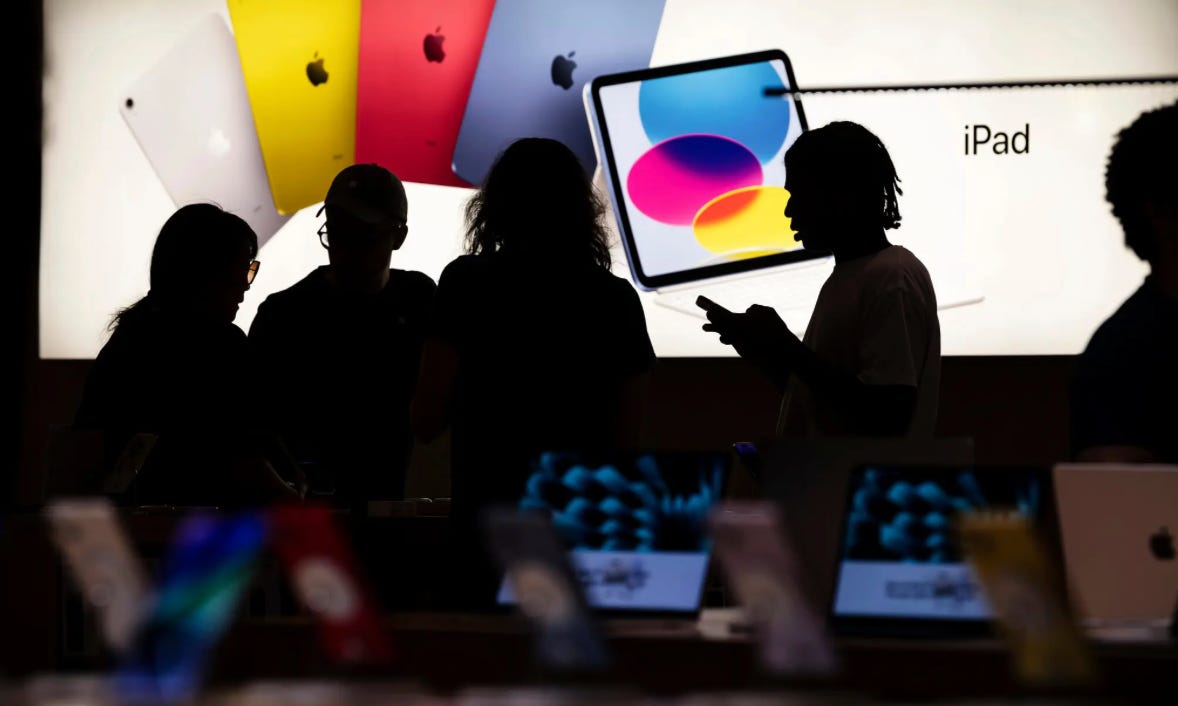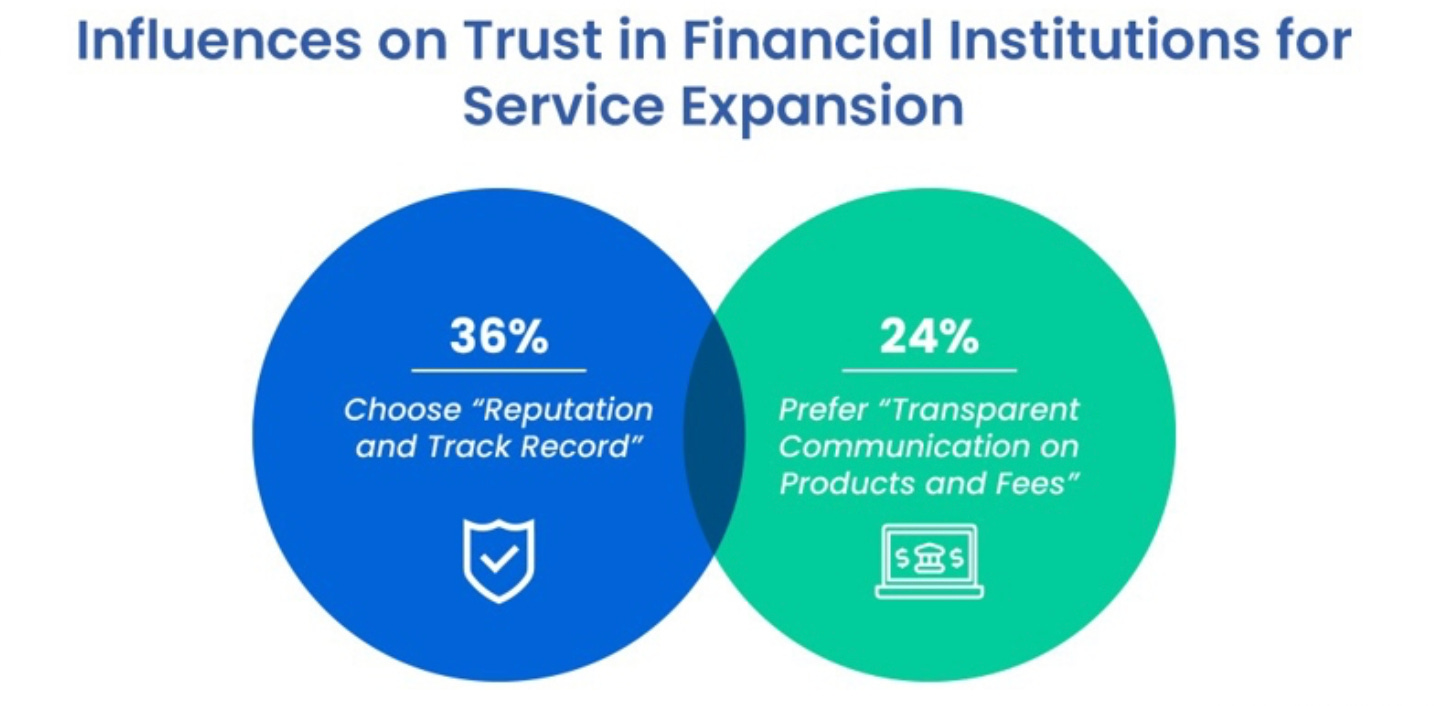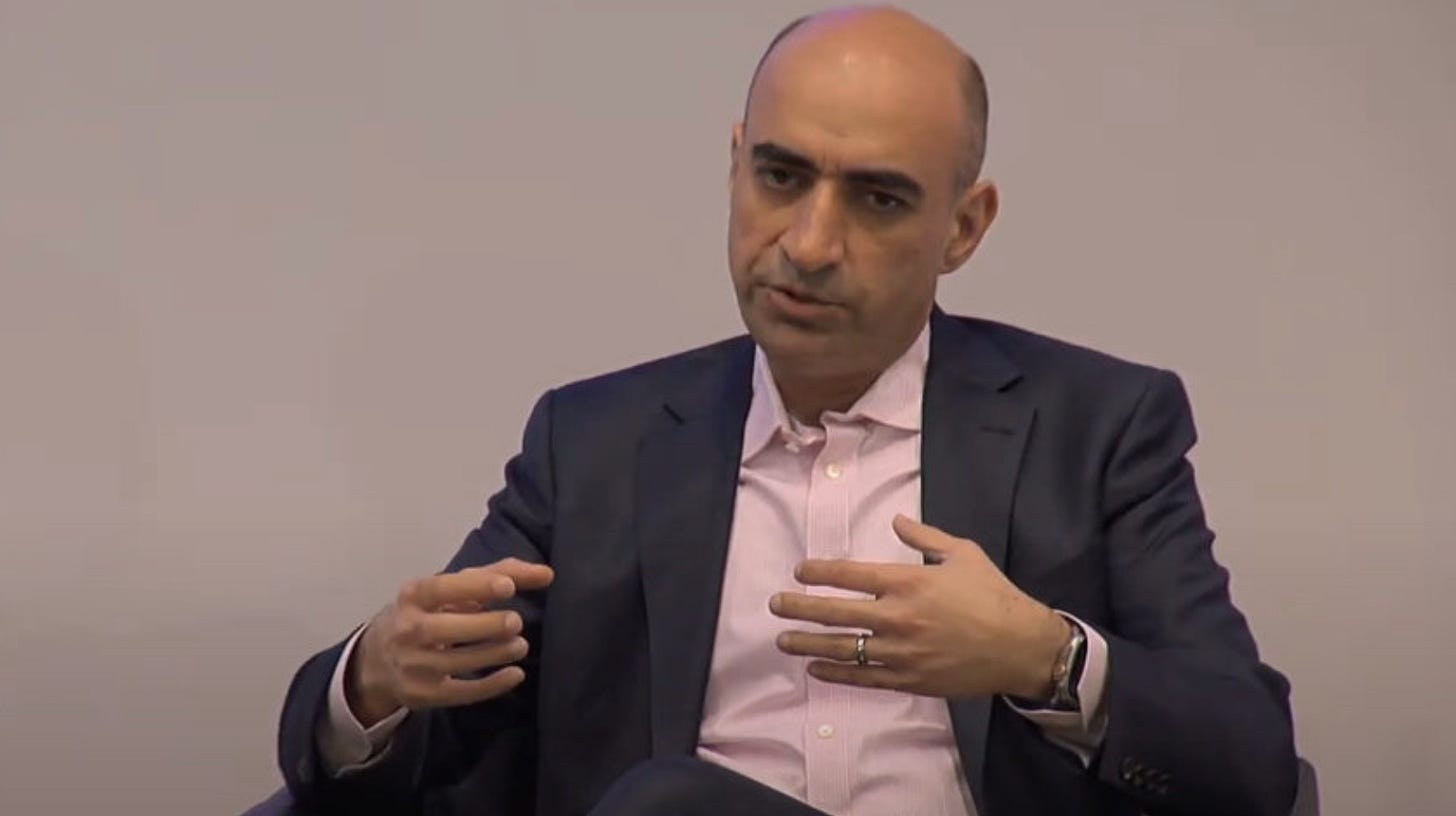Issue № 97 | London, Sunday 12 May 2024
📸 First, flashback to November 2022 when we talked about BrewDog’s CEO clumsily stirring up controversy on LinkedIn. Well, this week he stepped down.
👉🏻 Now, read on to learn why:
① Great marketing isn’t about products, it’s about emotion.
② Celebrating your customers, not selling to them makes for better ads.
③ Financial institutions continue to struggle to earn trust. Technology can help.
④ Both the securities and the cash leg of a transaction should be on blockchain.
⑤ People power is on the ascendant, from Cupertino to China.
⑥ Getting the right team on board and collaborating effectively is critical.
⑦ JP Morgan prefers unified ledger over public blockchain for tokenisation.
What's new
Apple launched a new iPad this week. Uncharacteristically for the Colossus of Cupertino, it also committed a faux pas, as the New York Times reports.

In short:
“The trumpet is the first thing to be squished. Then the industrial compressor flattens a row of paint cans, buckles a piano and levels what appears to be a marble bust. In a final act of destruction, it pops the eyes out of a ball-shaped yellow emoji. When the compressor rises, it reveals Apple’s latest commodity: the updated iPad Pro. Tim Cook, Apple’s chief executive, posted the advertisement, writing ‘meet the new iPad Pro: the thinnest product we’ve ever created. Just imagine all the things it’ll be used to create’.”
“But some creators took a different message from the one-minute iPad ad. Rather than seeing a device that could help them create, they saw a metaphor for how Big Tech has cashed in on their work by crushing or co-opting the artistic tools that humanity has used for centuries. The image was especially unnerving at a time when artists fear that generative artificial intelligence, which can write poetry and create movies, might take away their jobs.”
“Apple has been regarded as an advertising visionary since the 1980s. Its ‘1984’ Super Bowl commercial to introduce the Macintosh computer is among the most famous commercials ever made. The ad, which was developed by the Chiat/Day agency, showed an actor throwing a sledgehammer through a screen projecting the face of a ‘Big Brother’ figure that was meant to be a metaphor for IBM.”
Why it matters
Although I think this overreaction is the latest example of a regrettable trend fuelled by social media (people seemingly enjoy being offended by almost anything), there is no doubt that this isn’t Apple’s finest work. The mistake is glaring: it strays from the company’s usual approach of honouring its customers and honours its product instead. Compare the new iPad ad…
…with the best ad Apple - and arguably any brand - has ever made:
The difference is striking, isn’t it?
While there is something eerie about the former (it’s hard not to feel uncomfortable at the sight of beautiful things being destroyed, hard not to question the implication that instruments of creativity should be replaced by another slab of circuitry and glass), the latter fills us with aspiration, optimism and joy. It is a true celebration of creativity that draws us to the brand despite the fact that - perhaps because - there isn’t an Apple product in sight.
So, this story matters for three reasons.
The first is that it illustrates a shift in our cultural landscape. People power is on the ascendant (see ⑤ below) and even mighty Apple can get caught off guard by it. This week it was forced into a humbling apology (unthinkable even just a few years ago).
The second is that, in the age of AI, there is very real fear building up around Big Tech. Once embraced, technology is now increasingly perceived as the enemy of creativity. Technology marketers are going to have to start grappling with a challenge financial services marketers have had for decades: overcoming mistrust amongst their audience (see ③ below).
① And finally it matters because it reminds us that great marketing isn’t about products, it’s about emotion, about creating affinity. Steve Jobs - as ever - said it best when he introduced the now infamous ‘Think Different’ campaign:
“Marketing is about values.”
What to do about it
Take action
② You might think there isn’t much B2B financial or technology firms can learn from Apple’s misstep but I think there is plenty for us to take action on. The overarching lesson is simple: whether you’re selling consumer electronics or wholesale financial services, your customer should always be a the centre of your marketing efforts. What does this mean in practice?
Celebrate your customers: Demonstrate that you understand your customers be showcasing them and their wants - put them at the heart of your messaging, align your values with theirs, talk emotively to them.
Feature people not products: Don’t lead with your products or services. Focus instead on your customers’ challenges. What are they struggling with that you’re uniquely placed to help them with?
Guide the hero: Once you’ve cast your customer as the hero of the movie, take the role of a guide who can help the hero achieve better outcomes. Steer but be humble and let the hero take the credit.
Get help
InMarketing is a dynamic repository of help for senior leadership teams in finance or technology who want to drive growth: be inspired, find tactical support, or leverage strategic advisory.
Top stories
The other articles that are worthy of your time.
FINANCE
60% of clients don't trust financial institutions
③ Financial institutions continue to struggle to earn trust. Technology can help.

“[A] survey of 260 US customers of financial institutions with household incomes of $100,000-plus, revealed that just 40% of clients of these firms implicitly trust their financial institution as the primary financial advisor for multiple financial needs. It underscores that 60% of respondents do not ‘totally trust’ their financial service provider as their primary financial advisor for multiple financial needs.”
“Real-time engagement lies at the heart of effective customer communication for fintech companies. Embracing channels like chatbots, mobile apps, and social media platforms enables prompt and efficient interaction with customers. Timely assistance and support not only build trust but also play a crucial role in mitigating churn, ensuring sustained customer satisfaction.”
“Financial institutions should focus marketing on their track record when looking to cross-sell products. […] When asked about the factors that influence respondents’ level of trust in their financial institution when considering purchasing additional services, the top choice was ‘Reputation and track record,’ selected by 36% of respondents, followed by ‘transparent communication about products and fees’ noted by 24%.”
TECHNOLOGY
How the latest TradFi blockchain trial could mark the ‘five-yard-line’ for mass adoption
④ Both the securities and the cash leg of a transaction should be on blockchain.

“Payment giants Visa and Mastercard are coming together with banks JPMorgan, Citigroup and others to test a so-called Regulated Settlement Network. The proof-of-concept sets out to experiment with shared ledger technology to settle tokenised commercial bank money, wholesale central bank money, US Treasury securities and other tokenised assets.”
“This project represents a new phase of the Regulated Liability Network. Launched in November 2022, the initiative set out to demonstrate the use of shared ledger technology for regulated money movement on one platform.”
“Financial players have long explored how it could unlock greater automation and more standardised data rails via blockchain tech while cutting costs and offering greater transparency. Blockchain-focused proof-of-concepts and other tokenisation efforts have seemed to ramp up in recent months.”
MEDIA & MARKETING
Chinese PR executive’s online rant reignites criticism of tech work culture
⑤ People power is on the ascendant, from Cupertino to China.

“The head of public relations at Chinese search giant Baidu has created her own PR crisis after posting several videos on social media demeaning staff, in the latest example of the sometimes brutal workplace practices in China’s tech sector.”
“‘I can make you jobless in this industry,’ said Baidu vice-president Qu Jing in one video. She added she needed employees dedicated enough to do 50 straight days of business travel at her side and did not care if it affected their personal lives. ‘I’m not your mum,’ she said. ‘I only care about results’.”
“The executive posted the videos on Douyin, the Chinese version of TikTok, intending the clips to serve as examples to her team of how to use social media to promote Baidu. Instead, they have reignited criticism of the workplace culture at Chinese tech companies. As of Thursday, the discussion had drawn 150mn views and a former employee said Qu was no longer with the company, echoing reporting in Chinese media outlets.”
WILDCARD
Three management myths that derail startups
⑥ Getting the right team on board and collaborating effectively is more critical to a start-up’s success than technology, market fit, or having sufficient capital.
Scaling without hierarchy: “It’s possible to reap the positive aspects of hierarchy in a growing startup without suffering from the downsides of too much bureaucracy. […] Healthy hierarchy with effective managers can reduce operational ambiguity. It can help align the team around shared goals, resolve conflicts, speed up progress, and ensure that people’s development and well-being are looked after. […] If you need a collaborative team to solve complex problems, you’re better off with a boss in the mix instead of a group of equals.”
Structural harmony: “The biggest mistake many leaders make is to marginalise and disempower one function over another in an effort to resolve the conflict. […] We urge leaders to address structural conflicts by acknowledging them, asking those involved to clarify their priorities, and accept that some tensions between functional roles can never be fully resolved. […] In the end, the overall organisation’s goals have to take priority over any department’s goals.”
Sustained heroics: “Creating a hero culture is not the way to build an enduring business. Instead, think of heroics as a ‘break the glass in case of emergency’ option — and think hard before breaking that glass. This advice is not meant to diminish the value of deep commitment or hard work; just be mindful that disruptively solving problems that others were hired to address will have unintended consequences and can undermine your goals. Instead, invest your time and energy into building a stronger team and effective systems, which will help your people solve most of their own challenges without needing you to save the day.”
The Artificial Intelligence Spotlight 🔦
Brandblast: Automate your social media.
Synthesys: Create your own versions of any image you find online.
Website Generator: Build your new website, brainstorm content, and generate images.
Off cuts
The stories that almost made this week’s newsletter.
FINANCE
🏦 Banks, at least, are making money from a turbulent world
📉 Stock markets: Singapore battles to revive and AIM hit by sharp liquidity drop
🇨🇭 UBS sails past earnings estimates as it aims to draw a line under Credit Suisse
🌱 National payment systems are proliferating
💷 Monzo valued at £4.1bn after £150m funding to support expansion
TECHNOLOGY
⛓️ Citi, JP Morgan in SIFMA coordinated US DLT settlement trials
🤖 OpenAI is the 'biggest financial adviser in the world'
👐🏻 JP Morgan to open up Onyx Digital Assets to third party applications
🏪 Liquidise uses DeFi to create three-way private market
📱 Vodafone links its blockchain SIM to tokenised deposits
MEDIA & MARKETING
🪧 Driving offline engagement in an era of digital fatigue
🦾 How to get started with AI as a content creator
👩🏻⚖️ TikTok sues US government over potential ban
🐦 Jack Dorsey exits Bluesky, marking the end of an era for social media
📲 New York Times adds 210,000 digital subscribers in quarter
The last word
⑦ Umar Farooq, CEO, Onyx, comparing unified ledgers with public blockchains:

“We need to get to an evolution point where the technology starts to be seen as a public good versus as a means to enrich.”
Don’t settle for marketing.
Strive for InMarketing.
Wishing you a productive week,
P.S. I adore Wes Anderson’s work, aspire to being a good writer, and admire great advertising. So, imagine my joy upon stumbling across this little gem.





